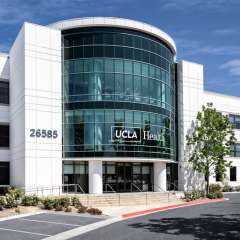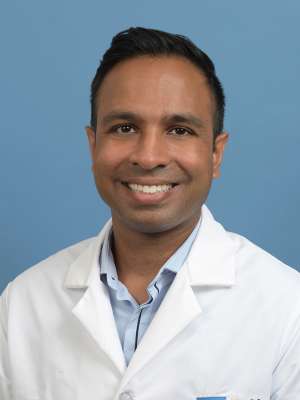Ravi N. Srinivasa, MD
- Interventional Radiology|
- Diagnostic Radiology
About
Ravi N. Srinivasa, MD is a Professor of Vascular and Interventional Radiology at the David Geffen School of Medicine at UCLA in the Department of Radiology, Division of Vascular and Interventional Radiology. He is a national expert on endoluminal management of hepatobiliary disease, portal interventions and lymphatic disease. Prior to joining UCLA he was faculty at the University of Michigan and the University of Texas in Houston. He completed his interventional radiology fellowship training at the University of Pennsylvania. He is board certified in both diagnostic and interventional radiology and is an inducted Fellow of the Society of Interventional Radiology.
Languages
Education
Medical Board Certification
Fellowship
Residency
Internship
Degree
Recognitions
-
 Top doctors, Los Angeles Magazine's Top Doctors 2025
Top doctors, Los Angeles Magazine's Top Doctors 2025
- Top Doctors, Los Angeles Magazine, 2024, 2025
Locations

Calabasas Imaging & Interventional Center
Hospital Affiliations
Medical Services
Videos
Research
Interests
Dr. Srinivasa has authored and co-authored over 140 peer-reviewed manuscripts and 6 book chapters and presented his work at numerous national and international meetings. His clinical and research interests are broad consisting of interventional oncology treatments including both transarterial and tumor ablative techniques, lymphatic embolization, venous disease, renovascular interventions, genitourinary and gastrointestinal interventions, uterine and prostate artery embolization, biliary interventions, portal interventions, interventional endoscopy, and pediatric interventions.
Publications
Insurance
- Aetna
- Anthem Blue Cross
- Blue Shield of California
- Centivo
- Cigna
- First Health
- Health Net of California
- Interplan (part of HealthSmart)
- Medicare Advantage
- MultiPlan
- UFCM Health System
- Prime Health Services
- Private Healthcare Systems (PHCS)
- TRICARE
- UnitedHealthcare
The list of health care plans above may not be comprehensive and could change.
Please contact your benefits coordinator or health insurance company directly to verify coverage.
Visit our health insurance information page for more details.
Recognitions
- Top Doctors, Los Angeles Magazine, 2024, 2025
